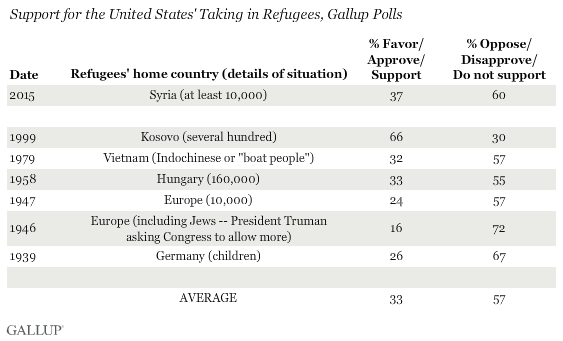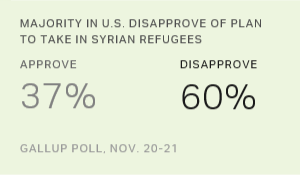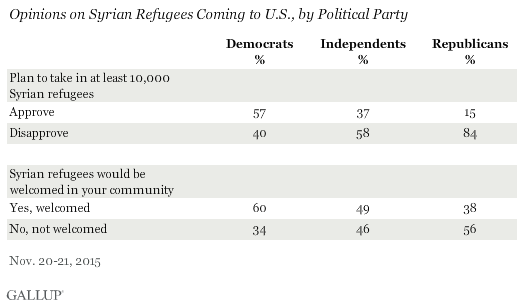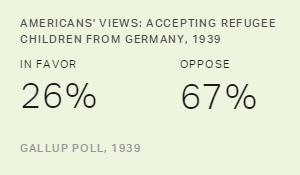Story Highlights
- 60% oppose accepting Syrian refugees; 37% in favor
- Historically, Americans have rarely favored accepting refugees
- Eight in 10 Republicans oppose taking in Syrian refugees
PRINCETON, N.J. -- Americans, by 60% to 37%, oppose plans for the U.S. to take in at least 10,000 Syrian refugees who are trying to escape the civil war in their country. This is in keeping with Americans' historical tendency to oppose taking in large numbers of refugees, something that has been evident in similar situations as far back as the 1930s.

Last week, the House of Representatives passed a bill to tighten the federal government's screening requirements on refugees from Syria. This action came after many governors said their states would refuse to take these refugees. Many in favor of halting the refugee program cite increased concerns about terrorism in the wake of the terrorist attacks in Paris earlier this month.

Despite the specific concerns about possible terrorism associated with accepting Syrian refugees, Americans' opposition to the current plan is in line with public opinion on refugee situations in the past. Across seven different refugee situations since 1939 for which Gallup has a basic support or opposition measure, the average level of public support has been 33% and the average level of opposition has been 57%.
Of these seven situations, the only one a majority of Americans supported involved Kosovo refugees in 1999. However, support may have been higher because the question mentioned that only several hundred refugees were being accepted, and the question was asked after the government had already taken that action.
Americans are a bit more positive when asked if the Syrian refugees would be welcomed if they came to their community -- 49% say they would be welcomed and 46% say they would not be. However, that is a slightly more negative assessment than Gallup found in a 1979 poll asking about Southeast Asian refugees, also known as the "boat people." At that time, 57% of Americans said those refugees would be welcomed in their community and 30% said they would not be.
In 1979 as well as now, many more said refugees would be welcomed in their community than were in favor of having them enter the U.S. This could indicate that Americans are expressing positive sentiments about their local community as much as support for the policy on taking in refugees when asked whether refugees would be welcomed.
Republicans Least Supportive of Taking In Syrian Refugees
Politics are a major influence on Americans' views about Syrian refugees. The majority of Democrats, 57%, approve of the plan for the U.S. to take the refugees, but a far larger majority of Republicans, 84%, disapprove. Independents' views are similar to the national average. These partisan differences are similar to what occurred in the House vote on the Syrian refugee bill, with nearly all Republicans voting in favor of the measure to tighten requirements for those refugees to gain entry to the U.S., and most Democrats voting against it.

Roughly six in 10 Democrats approve of the plan and say Syrian refugees would be welcomed in their local community. Republicans and, to a lesser degree, independents, are more inclined to believe Syrian refugees would be welcomed than to approve of letting them into the U.S. in the first place. Notably, though, a majority of Republicans still say the refugees would not be welcomed where they live.
Implications
Last week's House bill passed with enough votes to override an expected veto from President Barack Obama. However, as of now it is not clear whether the Senate will take up the measure, let alone pass it.
If the president does move forward on his plans to take in at least 10,000 Syrian refugees, he would be doing so without the American public's support. However, that would hardly be unprecedented, as Americans historically have not been supportive of plans to bring refugees to the U.S., and presidents have sometimes acted to take in refugees despite public opposition.
Why Americans have historically not been supportive of accepting refugees is unclear. To some degree it could be related to their more general views on having large numbers of new people enter the country, whether that be immigrants coming to the U.S. by choice or refugees coming to escape a troubled situation in their home country.
Americans have consistently said that immigration to the United States is a good thing. However, in the past 50 years Gallup has never found more than about a quarter of Americans calling for an increase in immigration levels; typically they have favored keeping the levels where they are, but at times a majority has called for a decrease.
Historical data are available in Gallup Analytics.
Survey Methods
Results for this Gallup poll are based on telephone interviews conducted Nov. 20-21, 2015, on the Gallup U.S. Daily survey, with a random sample of 1,013 adults, aged 18 and older, living in all 50 U.S. states and the District of Columbia. For results based on the total sample of national adults, the margin of sampling error is ±4 percentage points at the 95% confidence level. All reported margins of sampling error include computed design effects for weighting.
Each sample of national adults includes a minimum quota of 60% cellphone respondents and 40% landline respondents, with additional minimum quotas by time zone within region. Landline and cellular telephone numbers are selected using random-digit-dial methods.
View survey methodology, complete question responses and trends.
Learn more about how the Gallup U.S. Daily works.

